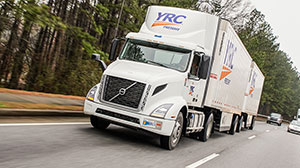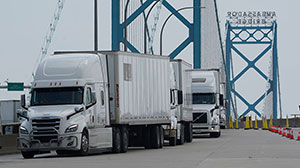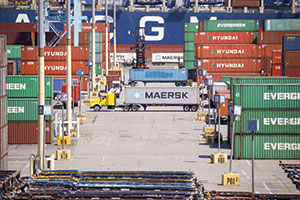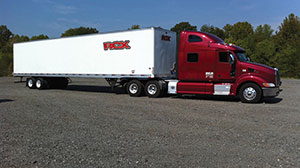2021 Top 10 Stories Cover Array of Issues as COVID Still Casts Shadow

[Stay on top of transportation news: Get TTNews in your inbox.]
Here are the 10 most-read stories on the Transports Topics website in 2021, based on Google Analytics. Unlike in 2020, when eight of the top 10 stories were directly related to the COVID-19 pandemic, only one story in 2021 had a direct relation. Two others, however, were related to the snarled supply chain that was exposed during the pandemic.Two of the top 10 stories were about TFI's acquisition of Uber Freight, in a year that saw many mergers and acquisitions. For more coverage of trucking in 2021, see the 2021 Year in Review.
No. 1: Officials Call $202,000 Towing Bill a Textbook Example of a Scam
By Eric Miller, Senior Reporter

Goochland County Fire Rescue via FaceBook
A Wisconsin motor carrier got a big surprise when one of its tractor-trailers hauling a truckload of cheese had to be pulled from a ditch on I-64 in central Virginia: A $202,000 removal and towing bill.
“We all fell off our chairs,” said Eric Van Handel, the president of Kaukauna, Wis.-based Midwest Carriers, when he saw the bill. He immediately suspected he was being overcharged for a removal and towing that he claimed was pretty routine. He keeps a copy of the Aug. 23, 2020, invoice on his office bulletin board to amuse his visitors.
“They can’t believe it,” Van Handel told Transport Topics.
Jennifer Wieroniey, executive director of American Trucking Associations’ National Accounting & Finance Council, called the invoice a textbook example of an outrageous charge for “just a simple tow.” The NAFC is collecting information from its members on predatory towing billing and plans to seek legislation to stop the unscrupulous practice.
Noteworthy: Readers spent more time on this story from March 11 than any other in the top 10.
No. 2: FMCSA Issues Emergency Declaration to June 8 Due to Pipeline Cyberattack
By Eugene Mulero, Senior Reporter

WendellandCarolyn/Getty Images
The Federal Motor Carrier Safety Administration is providing emergency relief from hours-of-service regulations to motor carriers and drivers assisting operations linked to refined petroleum supply chains in the East Coast in the wake of a cyberattack against Colonial Pipeline, which has extensive operations across multiple states.
The agency issued an emergency relief declaration May 9, and indicated the relief would be in effect through June 8 or until officials determine the emergency to be over.
The declaration covers operations in Alabama, Arkansas, Washington, D.C., Delaware, Florida, Georgia, Kentucky, Louisiana, Maryland, Mississippi, New Jersey, New York, North Carolina, Pennsylvania, South Carolina, Tennessee, Texas and Virginia.
Noteworthy: This story from May 9 brought cybersecurity concerns to light. Groups representing various infrastructure sectors called for robust methods to protect the country’s freight and mobility grids.
No. 3: TFI International Completes UPS Freight Acquisition
By Dan Ronan and Connor D. Wolf, Staff Reporters

UPS by John Sommers II for Transport Topics
TFI International has completed its previously announced acquisition of UPS Freight, the company said April 30.
The UPS division, which is focused on less-than-truckload and dedicated truckload shipments, was acquired by TFI in an $800 million deal announced in January.
TFI, a transportation and logistics company based in Montreal, said approximately 90% of the acquired business will operate independently within its LTL segment under the new name TForce Freight. The former UPS Freight dedicated truckload assets will be incorporated into TFI’s truckload segment.
As part of the deal, TFI has entered into a five-year contract to use the UPS domestic network to move packages.
Noteworthy: This story from May 3 combined with No. 5 in the top 10 had more reader views than the No. 1 story. 2021 was an especially busy year for mergers and acquisitions.
No. 4: Diesel Exhaust Fluid Sensor Failures Sideline Thousands of Trucks
By Eric Miller, Senior Reporter

jacquesdurocher/Getty Images
Ongoing shortages of replacement parts for failed diesel exhaust fluid quality sensors are believed to be causing thousands of trucks nationwide to be disabled and parked.
The sensors, which measure the quality and level of diesel exhaust fluid (DEF) in the tank, normally retail for roughly $300. But due to global computer chip shortages causing a backlog the part is being offered for sale — in some cases on digital retail sites such as eBay — for as much as $7,000, according to some industry technicians.
“It’s part of the global chip shortage,” Paul Enos, CEO of the Nevada Trucking Association, told Transport Topics. “We’re seeing trucks parked throughout the country. Just here in Nevada, 300 trucks are parked waiting for quality level sensors.”
Noteworthy: This story from Sept. 9 was one of two related to the snarled supply chain that was in part a result of the pandemic. Software fixes for the problem soon rolled out from truck manufacturers.
No. 5: TFI Buys UPS Freight for $800 Million
By Connor D. Wolf, Staff Reporter

Transport Topics
TFI International Inc. is acquiring UPS Freight in an $800 million deal that company leaders said aligns with their businesses’ individual and shared goals.
Under the deal, announced Jan. 25, UPS Freight’s less-than-truckload business will operate independently within TFI’s LTL business segment under its new name, TForce Freight, while the dedicated truckload side will join TFI’s truckload business segment.
The companies also are entering an agreement under which TForce Freight will continue to utilize UPS’ domestic package network to fulfill shipments for a period of five years. TForce Freight, in turn, will continue to serve the ongoing LTL distribution needs of UPS, TFI CEO Alain Bédard told Transport Topics.
Noteworthy: This story from Jan. 25 combined with No. 3 in the top 10 had more reader views than the No. 1 story.
No. 6: New 7/3 Split Sleeper Berth Rule Appears Slow to Gain Popularity
By Eric Miller, Senior Reporter

EpicVue
Veteran owner-operator truck driver Gary Buchs says that splitting sleeper berth time might have some advantages, but frankly he finds it pretty darn confusing.
“I use the 8/2 split a lot,” Buchs said at a 2018 Federal Motor Carrier Safety Administration listening session in Dallas. “It can be difficult — the math can be difficult.”
He uses a computer program to help him figure out how the sleeper berth split impacts his 14-hour workday.
“As an officer once told me, you have to be an Einstein to do your logbook,” Buchs said. “Many of us that are in this business know that.”
Fast-forward two years later — the more things change and the more they seem to stay the same: A tweak of the hours-of-service (HOS) rule that went into effect on Sept. 29 has put a new 7/3 split in the mix as an alternative to meet 10-hour off-duty requirements in the sleeper berth. It also may be a bit confusing.
Which could explain — at least in part — why regulators and tech experts are hearing that the new 7/3 split appears to be slow in taking hold in the trucking industry. Even on the internet boards, where truckers jaw about their issues of the day, questions on the 7/3 split are common.
Noteworthy: This story from Feb. 2 focused on drivers. Other issues involving drivers included vision standards and drug testing.
No. 7: LTL Carrier Yellow to Hire 1,500 New Drivers
By Dan Ronan, Associate News Editor

Yellow Corp.
Yellow Corp. is launching a driver-training initiative that aims to bring up to 1,500 new drivers into the trucking industry.
“We need to get more talented men and women into the trucking industry,” Darren Hawkins, CEO of the Overland Park, Kan.-based less-than-truckload carrier, told Transport Topics earlier this month after the company changed its corporate name from YRC Worldwide. “Many Americans are looking to start a new career, and these are good jobs with competitive benefits in a community near you.”
According to a Feb. 22 announcement, the company will offer an eight-week CDL training program at 12 locations.
Yellow said students will be in class 40 hours a week during the four-week, paid training program, with an instructor preparing them for the appropriate state’s Class A CDL skills and road test. If the student is away from home during the program, Yellow will provide pay for travel and accommodations. After completing the program, there are four more weeks of training at the driver’s home terminal.
“We are growing our own CDL drivers,” Hawkins said, adding, “2021 is going to be a growth year for us.”
Noteworthy: This story from Feb. 22 was one of many this year that highlighted the nationwide driver shortage.
No. 8: Border Congestion Feared as Vaccination Requirements Change in January
By Dan Ronan, Associate News Editor

Paul Sancya/AP
The flow of freight between the United States and its neighbors Canada and Mexico could slow beginning in January, as all three countries adopt more stringent COVID-19 vaccine requirements for cross-border truck traffic.
“All inbound foreign national travelers seeking to enter the United States via land points of entry or ferry terminals — whether for essential or nonessential reasons — must be fully vaccinated for COVID-19 and provide related proof of vaccination,” said a bulletin from the U.S. Department of Homeland Security. While the Nov. 23 announcement said only that the restrictions would be adopted in January, it’s expected they’ll take effect Jan. 22.
The DHS rule applies to non-U.S. citizens crossing into the country.
Noteworthy: This story from Dec. 2 was the only one in the top 10 that was directly related to the pandemic.
No. 9: Congestion, Slowdown at Ports Cause Growing Concern
By Dan Ronan, Associate News Editor

Patrick T. Fallon/Bloomberg News
Many of the nation’s ports, especially on the West Coast, are reporting long delays to unload cargo ships, and warehouses near those facilities are filled as the supply chains are overloaded with goods.
That is the result of retailers seeing a surge in e-commerce purchases and significant changes to spending patterns of U.S. consumers and businesses.
“It’s really the perfect storm,” supply chain and logistics expert Mirko Woitzik with Resilience360 said from Cologne, Germany, in an interview with Transport Topics.
“There are so many factors that are contributing to this. There are so many different interests between the truckers, the carriers, the port operators and then put the COVID situation into this, the huge demand, and the previous huge drop in demand six months ago. It’s not probably going to be solved until the Chinese New Year, in the middle of February 2021.”
Typically, then there’s a lull in shipping as factories in Southeast Asia shut down for several weeks.
Noteworthy: This story from Sept. 9 was one of two related to the snarled supply chain that was in part a result of the pandemic. Despite the congestion, on the East and West Coast and at ports along the Gulf of Mexico, container volumes have skyrocketed.
No. 10: Arkansas Carrier Forced to Close After Multimillion-Dollar Ruling
By Eric Miller, Senior Reporter

Randy Clifton
Over Valentine’s Day dinner last year, Randy Clifton and his wife, Karyn, decided the fate of the trucking company that had been Randy’s pride and joy for a decade.
The odds were stacked against the third-generation trucker. That same month, the bank froze his credit line and his insurance costs doubled, the result of a multimillion-dollar jury verdict for a 2015 accident involving a truck and driver for a motor carrier that Clifton’s company, RCX Solutions Inc., had brokered with to haul a load of cosmetics in an RCX trailer.
“We agreed, we’re done,” Clifton said of the couple’s fateful dinner discussion about the years-long legal battle over the incident. “We fought it, we’re tired of it. We’re just going to have to shut it down.” He added, “We had truck driver families, and 12 people in the office. That one accident affected a lot of people.”
The carrier closed down March 1, 2020.
Noteworthy: This story from March 24 highlighted the consequences of "nuclear verdicts" against carriers. Other legal issues this year involved efforts to curb staged accidents.
Want more news? Listen to today's daily briefing below or go here for more info:

